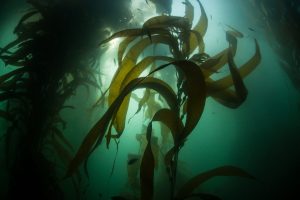
BRITISH COLUMBIA – BC businesses are strengthening food security and food safety by adopting new traceability technology with funding from the governments of Canada and BC.
Traceability systems help build consumer confidence, making it possible to track the movement of food through production, processing and distribution. This information can be used to protect public health by limiting the spread of foodborne illness, strengthen brand reputation and help businesses run more efficiently.
Cascadia Seaweed was founded in 2019 by Bill Collins, Mike Williamson and Tony Ethier. Each founder has a connection to the ocean – from developing sonar systems for institutions around the world, to commanding a Canadian navy base, to degrees in ocean science.
Cascadia Seaweed has established four farms off of Vancouver Island (two in Barkley Sound and two in the Discovery Islands) where it grows different types of seaweed, including sugar kelp (Saccharina latissima) and winged kelp (Alaria marginata), while growing a red algae or, dulse (Palmaria mollis), in 10 tanks on land. Cascadia plans to offer more varieties as the business continues to grow and evolve.
“Local businesses like Cascadia Seaweed are the heart of coastal communities in BC, and its work creates a product that is respected and enjoyed around the world,” said Lana Popham, BC’s Minister of Agriculture, Food and Fisheries. “By making traceability systems more accessible to businesses, we’re helping companies create safe and reliable food for consumers while strengthening BC’s food system.”
With more than 600 species available in BC, seaweed is a versatile crop that can be used by restaurants and food processors, and in products such as livestock feed, pet food, cosmetics and pharmaceuticals. Researchers are also using seaweed to develop plastic alternatives.
BC seafood is known for its great taste and sustainability. With more than 100 commercial fish, shellfish and marine plants, companies like Cascadia Seaweed are contributing to BC’s reputation by adopting traceability technology.
Through traceability, Cascadia Seaweed is sharing its connection to the ocean with consumers. Cascadia received $12,500 through the Traceability Adoption Program to develop a traceability system for its business. The funding allowed the company to purchase the necessary software and equipment, as well as provide training to employees on how to operate the different components of the system. The traceability system will help Cascadia document where each variety of seaweed was grown, harvested and processed as the food makes its way to consumers.
“Our changing world has highlighted the need for food security,” said Bill Collins, chairman, Cascadia Seaweed. “Food security not only means a consistent and reliable route to our table, it also means a route with transparency, so consumers can trust what they eat. BC traceability helps us achieve that goal.”
Traceability programs are supported by the Canadian Agricultural Partnership, a federal-provincial-territorial initiative to strengthen and grow the agriculture, agrifood and agri-based product sector.
In 2019, nearly 26,500 kilograms of farmed plants and algae have been harvested off the coast of BC, valuing nearly $251,000.


